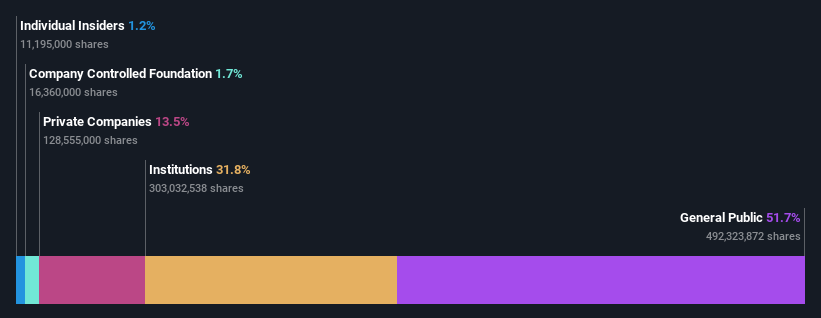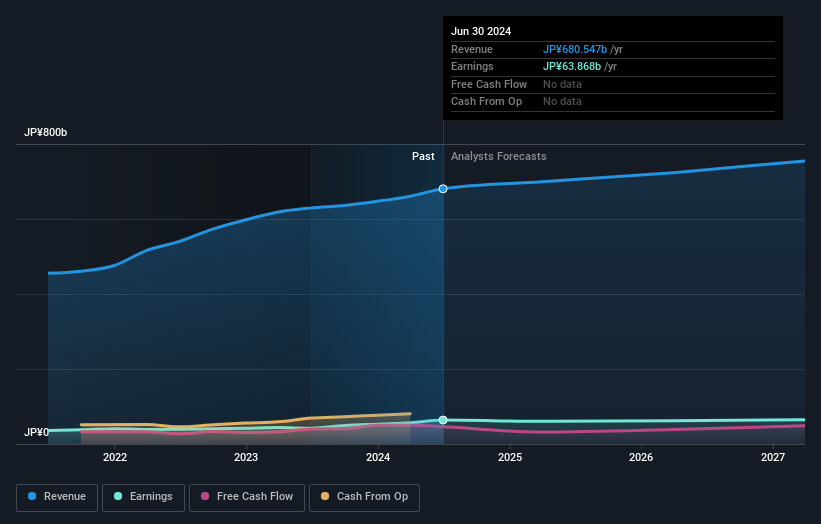Kikkoman Corporation's (TSE:2801) top owners are retail investors with 52% stake, while 32% is held by institutions
Key Insights
- Kikkoman's significant retail investors ownership suggests that the key decisions are influenced by shareholders from the larger public
- 44% of the business is held by the top 25 shareholders
- Institutions own 32% of Kikkoman
A look at the shareholders of Kikkoman Corporation (TSE:2801) can tell us which group is most powerful. The group holding the most number of shares in the company, around 52% to be precise, is retail investors. That is, the group stands to benefit the most if the stock rises (or lose the most if there is a downturn).
Institutions, on the other hand, account for 32% of the company's stockholders. Large companies usually have institutions as shareholders, and we usually see insiders owning shares in smaller companies.
Let's take a closer look to see what the different types of shareholders can tell us about Kikkoman.
Check out our latest analysis for Kikkoman

What Does The Institutional Ownership Tell Us About Kikkoman?
Institutional investors commonly compare their own returns to the returns of a commonly followed index. So they generally do consider buying larger companies that are included in the relevant benchmark index.
As you can see, institutional investors have a fair amount of stake in Kikkoman. This can indicate that the company has a certain degree of credibility in the investment community. However, it is best to be wary of relying on the supposed validation that comes with institutional investors. They too, get it wrong sometimes. It is not uncommon to see a big share price drop if two large institutional investors try to sell out of a stock at the same time. So it is worth checking the past earnings trajectory of Kikkoman, (below). Of course, keep in mind that there are other factors to consider, too.

Kikkoman is not owned by hedge funds. The company's largest shareholder is BlackRock, Inc., with ownership of 5.4%. The second and third largest shareholders are The Vanguard Group, Inc. and SENSYUSYA Co.,Ltd., with an equal amount of shares to their name at 3.5%.
On studying our ownership data, we found that 25 of the top shareholders collectively own less than 50% of the share register, implying that no single individual has a majority interest.
Researching institutional ownership is a good way to gauge and filter a stock's expected performance. The same can be achieved by studying analyst sentiments. There are a reasonable number of analysts covering the stock, so it might be useful to find out their aggregate view on the future.
Insider Ownership Of Kikkoman
The definition of company insiders can be subjective and does vary between jurisdictions. Our data reflects individual insiders, capturing board members at the very least. Management ultimately answers to the board. However, it is not uncommon for managers to be executive board members, especially if they are a founder or the CEO.
I generally consider insider ownership to be a good thing. However, on some occasions it makes it more difficult for other shareholders to hold the board accountable for decisions.
Shareholders would probably be interested to learn that insiders own shares in Kikkoman Corporation. It is a very large company, and board members collectively own JP¥18b worth of shares (at current prices). we sometimes take an interest in whether they have been buying or selling.
General Public Ownership
The general public -- including retail investors -- own 52% of Kikkoman. This size of ownership gives investors from the general public some collective power. They can and probably do influence decisions on executive compensation, dividend policies and proposed business acquisitions.
Private Company Ownership
It seems that Private Companies own 14%, of the Kikkoman stock. It might be worth looking deeper into this. If related parties, such as insiders, have an interest in one of these private companies, that should be disclosed in the annual report. Private companies may also have a strategic interest in the company.
Next Steps:
It's always worth thinking about the different groups who own shares in a company. But to understand Kikkoman better, we need to consider many other factors. For example, we've discovered 1 warning sign for Kikkoman that you should be aware of before investing here.
If you are like me, you may want to think about whether this company will grow or shrink. Luckily, you can check this free report showing analyst forecasts for its future.
NB: Figures in this article are calculated using data from the last twelve months, which refer to the 12-month period ending on the last date of the month the financial statement is dated. This may not be consistent with full year annual report figures.
Valuation is complex, but we're here to simplify it.
Discover if Kikkoman might be undervalued or overvalued with our detailed analysis, featuring fair value estimates, potential risks, dividends, insider trades, and its financial condition.
Access Free AnalysisHave feedback on this article? Concerned about the content? Get in touch with us directly. Alternatively, email editorial-team (at) simplywallst.com.
This article by Simply Wall St is general in nature. We provide commentary based on historical data and analyst forecasts only using an unbiased methodology and our articles are not intended to be financial advice. It does not constitute a recommendation to buy or sell any stock, and does not take account of your objectives, or your financial situation. We aim to bring you long-term focused analysis driven by fundamental data. Note that our analysis may not factor in the latest price-sensitive company announcements or qualitative material. Simply Wall St has no position in any stocks mentioned.
About TSE:2801
Kikkoman
Through its subsidiaries, engages in the manufacture and sale of food products in Japan and internationally.
Flawless balance sheet established dividend payer.
Similar Companies
Market Insights
Community Narratives





